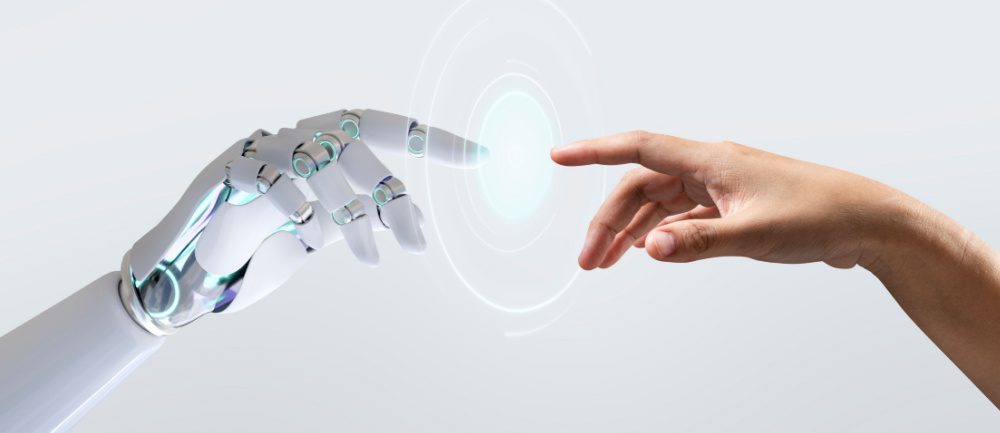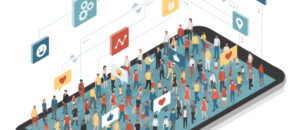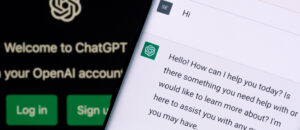AI won’t replace us, but we will need to work with it
- 4 Min Read
While AI tools will never fully replace humans in the workplace, many jobs will be augmented or completely transformed by artificial intelligence.
- Author: Bernard Marr
- Date published: Apr 3, 2023
- Categories

Artificial Intelligence (AI) has hit an important inflection point, and it is transforming the way businesses operate. AI is not just a technological innovation; it is a social and economic phenomenon.
While AI won’t replace humans in the workplace, HR leaders should understand how these emerging technologies will fundamentally change the nature of work.
Let’s explore a few of the most important ways AI is shaping the workplace, what companies should be prioritizing going forward, and how HR leaders can work with these technologies effectively.
AI won’t replace us, but we will need to work with it
We have seen the craze around generative AI tools like ChatGPT and Dall-E 2 that are putting the power of AI into the hands of everyone. Generative AI tools can create text, images, videos, and other forms of content that would have previously required human input.
There’s a lot of fear — particularly in certain sectors — that these powerful new tools will completely replace us, and that there’s going to be a massive loss of jobs because of them.
There’s no doubt that AI will create a shake-up in the workplace. AI will likely replace 85 million jobs worldwide by 2025, according to the World Economic Forum’s “Future of Jobs Report 2020.”
Yes, that sounds scary. But the same report also says that AI will create 97 million new jobs in the same timeframe.
The most important thing to remember is that AI will replace certain jobs, but it will augment far more. To succeed in the future, people will need to learn to work alongside AI as it changes the way they do their jobs.
HR leaders need to foster a culture of collaboration between humans and AI tools to achieve the best results.
The need to understand AI tools
In order for us to effectively collaborate with intelligent robots, we need to understand AI’s strengths and weaknesses, as well as our own.
AIs are good at data analysis, automating repetitive manual and cognitive tasks, memorizing and recalling large amounts of information, predicting behavior, etc. — which means humans need to focus on developing and maintaining complementary skills.
Not only will HR leaders need to understand the basics of how AI tools work, so they can understand how these tools will impact the workplace, but they’ll also need to ensure employees know how to interact with AI tools effectively.
Employees need to know how to use AI tools to augment their work and make better decisions – and HR leaders need to provide training opportunities for employees to learn how to use AI tools effectively.
Embracing intrinsically human skills
To collaborate effectively with AI, humans need to understand the capabilities of these tools and how to interact with them in positive ways. Even more importantly, they need the intrinsically human skills that AI doesn’t have, including creativity, critical thinking, judgment and complex decision-making, emotional intelligence, interpersonal communication, curiosity, and continuous learning.
While these have previously been considered “soft skills,” and are sometimes overlooked in favor of more technical expertise, they will be the skills that are most in demand in the workplace of the future.
HR leaders will play a critical role in helping businesses navigate the new environment that places more focus on these intrinsically human skills. Human resource departments will need to identify the skills that are most important for their companies for the future, and provide the right development opportunities for people to make that shift.
Part of navigating this transformation will be proactively identifying the roles that will be most impacted by AI, and helping employees acquire new skills or transition to different roles.
Understanding and adapting to the enormous potential of AI
AI is transforming the workplace, and it is up to HR leaders to lead the way in this new world of work. Many future jobs will either be replaced or augmented by AI, so workers will need to understand how to use these tools to achieve business goals.
To help companies adapt to this new reality, HR professionals should focus on providing employees with opportunities to build the skills they need to succeed in the new AI-assisted workplace. By focusing on complementary skills and continuous learning, businesses can thrive in the era of intelligent machines.
____
Bernard Marr is a world-renowned futurist, influencer, and thought leader in the fields of business and technology. He is also the author of Future Skills: The 20 Skills and Competencies Everyone Needs to Succeed in a Digital World.



